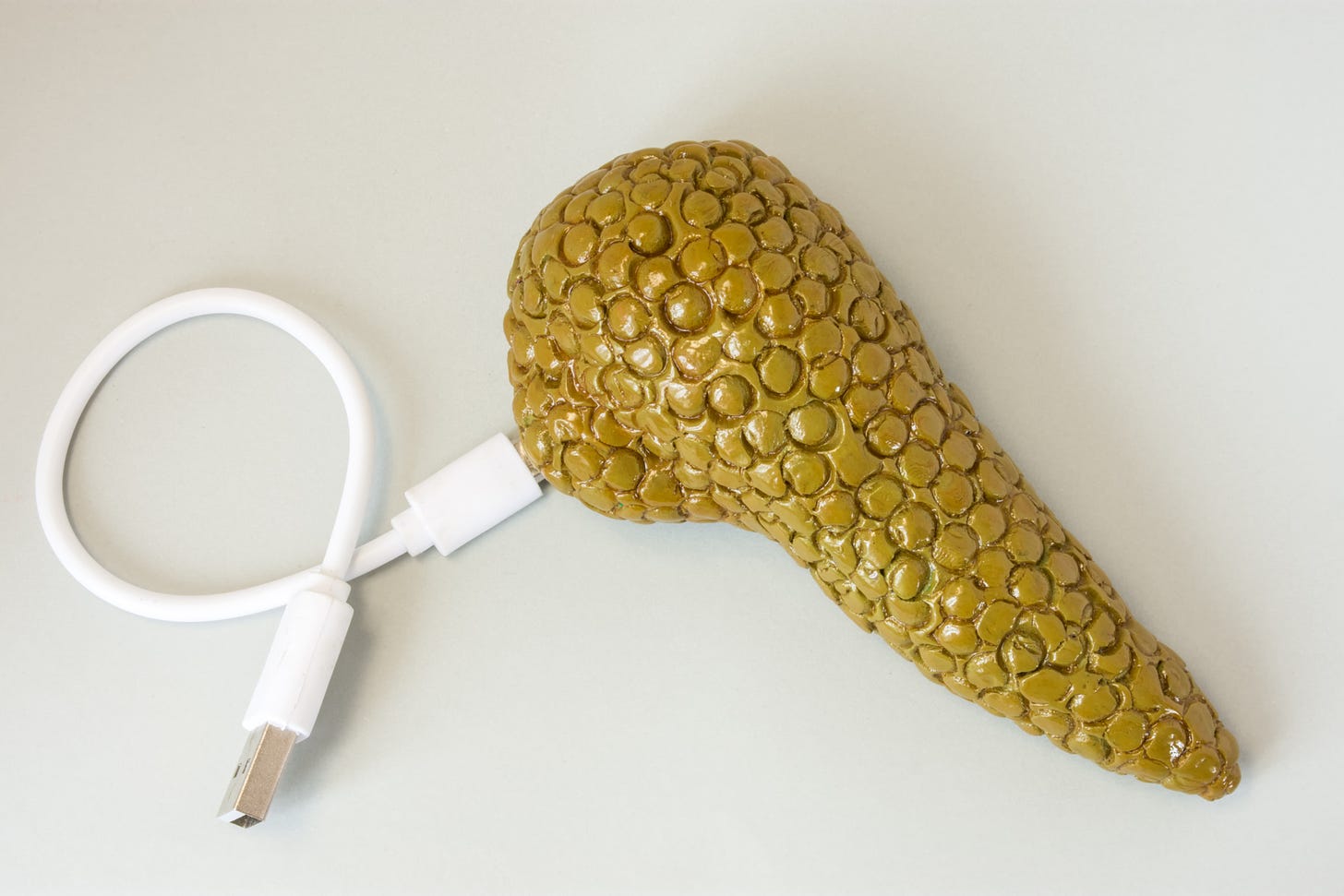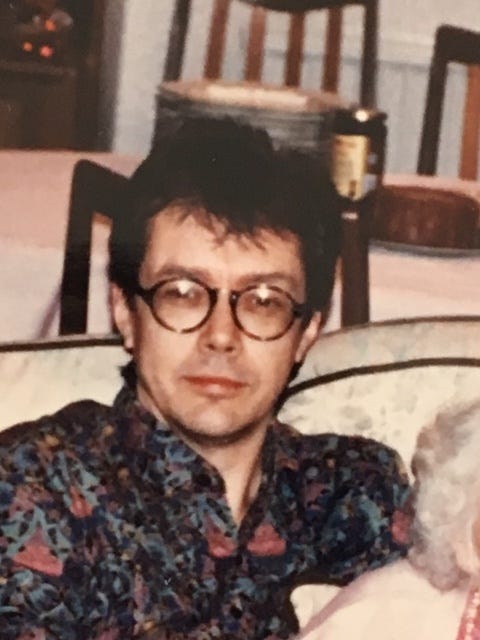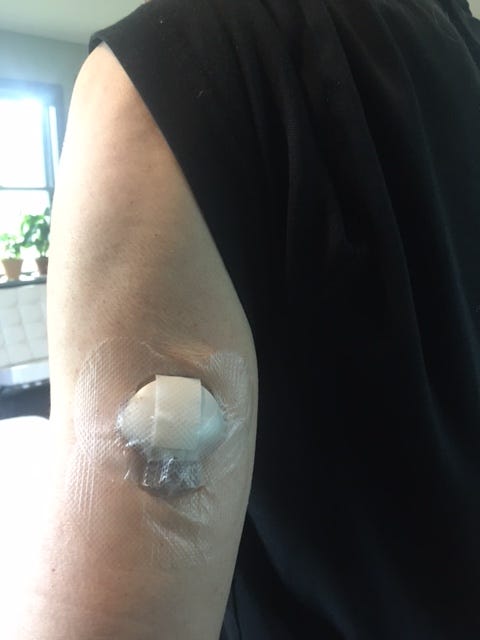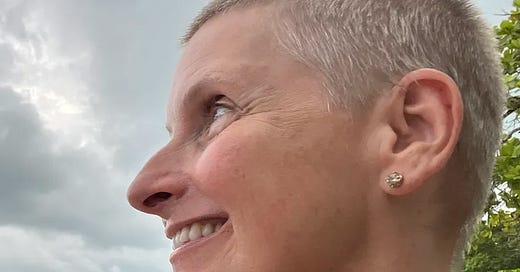
My Life as a Cyborg
A continuous glucose monitoring device has allowed 73-year-old type-1 diabetic Richard Toon to (so far) live 13 years longer than doctors once projected. Now he's confronting ageism in treatment.

My life was not imaginable by anyone, including me, even a few years ago. I’m a type-1 diabetic, the kind where your pancreas produces little or no insulin. When in 1973 I was first diagnosed in England at the age of 23, I was told by my doctor not to expect to live past 60. His name was Dr. Batty. He was giving me the odds.
Two months ago, I turned 73, meaning I’ve lived with the disease for fifty years. For fifty years, too, I’ve skirted possible complications. The complications of type-1 diabetes—the things that typically disable and kill a person—include heart attacks, strokes, amputated limbs, blindness, and kidney failure.
I’ve lived long enough to become old, or oldish, and I’m not alone. In 1973, my life expectancy was estimated to be twenty years fewer than non-diabetics. Recently, the figure was reduced to eight years fewer. The mortality rate of people with type-1 diabetes is improving faster than for the general population. I’m catching up to the norm.
I got this far with my eyesight intact and with all four limbs still attached because of vastly improved care. There’s no cure for type-1 diabetes, but there are many more options than earlier for monitoring blood sugar levels and receiving insulin to regulate high blood sugar. I was lucky to be diagnosed when I was. I have been lucky to see the advances of the past forty years or so: test strips to check blood sugar levels, self-monitoring blood glucose meters, a blood test to determine levels of control over the previous three months, portable insulin pumps and continuous glucose monitoring systems (CGM) that use a pump, a sensor, and a transmitter to track and even predict glucose levels. The gizmos I insert into my body several times a week adjust my insulin levels every five minutes. This is such an unimaginably long way from where I started—sterilizing a glass syringe in a saucepan and injecting a daily dose of insulin—it’s like gaining an extra life.
I’m a type-1 diabetic, the kind where your pancreas produces little or no insulin. When in 1973 I was first diagnosed in England at the age of 23, I was told by my doctor not to expect to live past 60.
I lived in the right place, too. In 1984, I moved from the UK to New York City and volunteered to become a subject in a study of the disease. It was called the Diabetes Control and Complications Trial (DCCT), and when it ended, in 1993, it answered a question debated by endocrinologists, proving that the tight control of glucose levels greatly reduced the likelihood of complications. I remember the day the story headlined in the New York Times, declaring the study’s findings the most significant treatment for diabetes since Banting and Best discovered insulin in 1921.
The happiest outcome for a type-I diabetic today is they can live a normal life span if they have access to the latest treatment. Not everyone does. We have a lousy health care system in the US, where you need money for the things that keep people alive, mainly good medical insurance and access to good health care. The other thing you need to stay alive with my disease is the will to keep doing things to your body over and over. There’s no time off. When I was first randomized into the study, one of the nurses at the center said, “This is going to be easy, all you have to do is think about diabetes about every twenty minutes for the rest of your life.” I thought, not a bad deal. I think many people with chronic health conditions make similar deals.
The study has created an aging cohort as a result of its own findings. Having helped us survive so long, we’re now the first guinea pigs in new areas of research—I’ve remained a subject in all these trials. For instance, now that we can live long enough to become dotty, does type-1 diabetes produce more or the same number of cognitive deficits in us as in our general age group? My mother showed signs of dementia in her 70s, so of course I worry I’ll follow her, as an obedient son. Maybe I’m already losing it a bit. Short-term memory? People’s names? (Never my thing in the first place.) I think cognitive deficits are like the blind spot in our vision—your brain compensates and papers over the hole. Over time, my mother became progressively lost in her own thoughts and appeared unaware of it. Then again, I never asked her.
Last year, I took an online test as part of a study of short-term memory. I found it exhausting and tedious to move what looked like colored beads into increasingly complicated stacks. Ever since the test, I’ve worried my short-term memory is dying. I decided to look on the bright side. Now that I’ve retired from teaching in a university, I don’t need short-term memory as much! No committee meetings to keep track of! No conference presentations to prepare! Why not test long-term memory? I think this part of my brain is growing sharper. But then I would, wouldn’t I? I want to think the designers of the study of short-term memory are applying to older people a test that young people would be expected to pass. I could be wrong.
The gizmos I insert into my body several times a week adjust my insulin levels every five minutes. This is such an unimaginably long way from where I started—sterilizing a glass syringe in a saucepan and injecting a daily dose of insulin—it’s like gaining an extra life.
My continuous glucose monitoring system (CGM) is manufactured by Medtronic, the largest medical device company in the world. Medtronic claims that seventy-six million people are using their devices to keep all sorts of failing body parts going, from hearts to pancreases. If you’ve got a pacemaker, it’s probably from Medtronic.
Who does Medtronic market to? Who do they think they are keeping alive? Weirdly, not anyone my age. Medtronic is good with ethnic diversity, but the majority of people in their ads are happy, middle class, and young. Who do they market their CGM pumps to? Athletes, particularly marathon runners and triathletes in their 20s or 30s. What’s the message? We can fix you up so you can not only live a normal life, you can become a bionic champ? Is this gap any different from the way in general older people are marginalized or erased from public consciousness? Or has Medtronic not yet woken up to the reality there is a growing, aging population of diabetics they can market to?
Here’s something else that really pisses me off and should piss you off. As I’ve aged, the medical world has lowered its expectations for how I’ll perform as a patient. A young doctor I visited a few years ago said I shouldn’t worry about my chances of getting prostate cancer because it develops slowly and I would almost certainly die of something else first. I think he was trying to be optimistic. He’s actually a lovely guy. Nonetheless, this attitude of you’re slipping toward death so relax, honey, is common in the marketing and treatment of type-1 diabetes.
Standards of Care in Diabetes, published by The American Diabetes Association, has a section called “Older Adults.” How old are they? Older than whom? The editors don’t want to say old, directly. As you read on, you learn they mean anyone over 65. And here’s that thing I mentioned about waving you off as you drift away on an ice floe. The journal says, “Glycemic goals [that is, good blood sugar numbers] for some older adults might reasonably be relaxed.” Why the hell should they be relaxed when it’s precisely tight control that has gotten us this far in the first place? You’re assumed to be too wishy-washy about your own survival, because, you know, you can see the tunnel you’re rapidly approaching that goes in only one direction.
We’re on it! We care! I’m not going to bore you—well, only for a second, with the number of devices I fiddle with typically in a day, the alarms that hector me, blah, blah—I wouldn’t dream of neglecting or dimming them. Yes, we can see the tunnel, but so can you, at any age.
I’ve reached 73 mainly because I’ve had pretty good health care my entire life, not because my family had money. They did not. I was born into Britain’s National Health Service, created by an act of parliament in 1946. The system was designed by William Beveridge, a social reformer. He believed free health care would improve health overall and in time decrease demand on the system. It didn’t work out that way, to say the least. Within a few years of the creation of the NHS, the cost of sustaining it exceeded projections and citizens were charged one shilling per prescription beginning in 1952.
Here’s something else that really pisses me off and should piss you off. As I’ve aged, the medical world has lowered its expectations for how I’ll perform as a patient. A young doctor I visited a few years ago said I shouldn’t worry about my chances of getting prostate cancer because it develops slowly and I would almost certainly die of something else first.
Beveridge’s predictions didn’t pan out for a whole slew of reasons—take your pick—from the discovery and treatment of new conditions, the power of big Pharma, the increasing cost of healthcare delivery, increases in avoidable deaths, increases in chronic conditions, and COVID. Another key reason is the aging population throughout the developed world. The gift of modern medicine is that more and more of us become “older,” and stamped to it is the caution, Be careful what you wish for. Everywhere you see a worrisome ambivalence to our sustainability, especially in the mindset of “care might reasonably be relaxed,” once you’ve reached the desired yet expendable category.
In the US, life expectancy is decreasing. Except for me. For fun, I’ve started entering my data into various online life expectancy calculators. There are many. One calculated I have another sixteen years. Sad face. A different one said I have an additional twenty-one years. Smiley face. I was hoping for even more. I like life. I’ve worked hard for fifty years to have it. Here’s a bit of cheerful news for everyone: no matter what age you are, your life expectancy is always a future event. That is, the longer we live, the longer we live. I choose to be comforted by this, even though I know it’s only how statistics speak.



















I love this point about how ageism works in healthcare advertising and treatment--we want to sell to you, but we don’t want to look at you.
You’re fighting the good fight Richard. Not against diabetes (that too) but against doctors who say stupid things to patients until they themselves become patients.
I too when diagnosed with prostate cancer was told something else will kill me. Thanks Doc, great to hear. When my wife was diagnosed with leukemia one young cutie said, “it’s a no brainer if you get a bone marrow transplant. All you need is find a donor.” Duh! I just gave a talk to a support group for women with gynecologic cancer. The one husband in the audience--clearly worried--was “reassured” by her doctor that she had “already outlived the predictions”--implicitly so what’s the problem? 🤷🏼♂️
The problem is clueless doctors forgetting that their patients are more than their diseases--until of course, they become a patient and learn that they are mortal too.